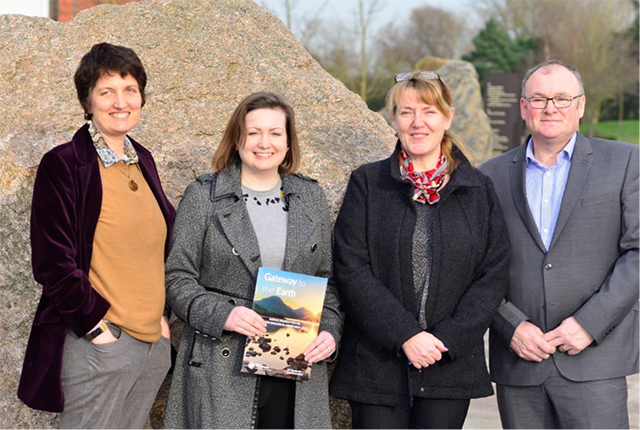British Geological Survey welcomes visit from Rushcliffe MP Ruth Edwards
12/02/2020 By BGS Press
Scientists at the British Geological Survey (BGS) welcomed newly elected Rushcliffe MP, Ruth Edwards, to its headquarters in Keyworth on Friday (7 February).
Ruth Edwards, who was first elected in the December 2019 general election, is the Conservative Member of Parliament for Rushcliffe.
She met with senior scientists, including Director of the BGS, Dr Karen Hanghøj, to speak about the opportunities they face in geological research and its major contribution towards a more sustainable future.
Discussions included a look at BGS’ refreshed science strategy, Gateway to the Earth. The strategy is focused on finding sound geological solutions to help meet environmental and climate change targets.
During her visit, she also met with BGS Chief Digital Officer, Prof Kate Royse and IT security manager, John Day, to share her insights about cyber security and its impact on digital technology at the BGS.
The BGS employs around 450 staff at its Keyworth site and the visit coincided well with the MP’s plans to meet people locally and speak about their priorities for the area.
Afterwards, Mrs Edwards enjoyed a tour of the BGS site, including a look behind the scenes at the largest core facility in the UK which is home to an impressive collection of on and offshore cores.
Following her tour, she said: “It was a pleasure to visit the BGS’s head office in Keyworth to meet Dr. Karen Hanghøj and her team and to tour the site.
“BGS is the largest employer in Rushcliffe and I was fascinated to be given just a snapshot of the crucial work it does for the government and other organisations as well as its work overseas.
“I was particularly interested to hear about its work on decarbonisation and the exciting ways it is using digital technology to enhance its research and make it accessible to a wider audience.”
Mrs Edwards’ career spans the business and tech sector, as well as a number of previous political roles which has included advising governments to help improve cyber security.
BGS Director, Dr Karen Hanghøj, said: “Ruth’s experience in cyber security is a huge asset to the community here in Rushcliffe and it was a pleasure to welcome her and show how local organisations are making an impact. It’s important more people recognise that geology has the power to change lives.”
For further details or to arrange media interviews please contact:
Hannah Pole, British Geological Survey Press Office, Keyworth, Nottingham, NG12 5GG
Office: +44 (0)115 936 3600
Mobile: +44 (0)7565 297 132
E-mail: hapo@bgs.ac.uk
Notes to Editors
For additional information go to: www.bgs.ac.uk
Images are free for media use with this acknowledgement: British Geological Survey©UKRI
British Geological Survey
The British Geological Survey (BGS) is a world leading applied geoscience research centre that is part of UK Research and Innovation (UKRI) and affiliated to the Natural Environment Research Council (NERC). BGS core science provides objective and authoritative geoscientific data, information and knowledge to inform UK Government on the opportunities and challenges of the subsurface. It undertakes national and public good research to understand earth and environmental processes in the UK and globally. The BGS annual budget of approximately £60 million pa is funded directly by UKRI, as well as research grants, government commissions and private sector contracts. Its 650 staff work across the UK with two main sites, the head office in Nottingham and Lyell Centre, a joint collaboration with Heriot Watt University in Edinburgh. BGS works with more than 150 private sector organisations, has close links to 40 universities and sponsors about 100 PhD students each year. Please see www.bgs.ac.uk.



